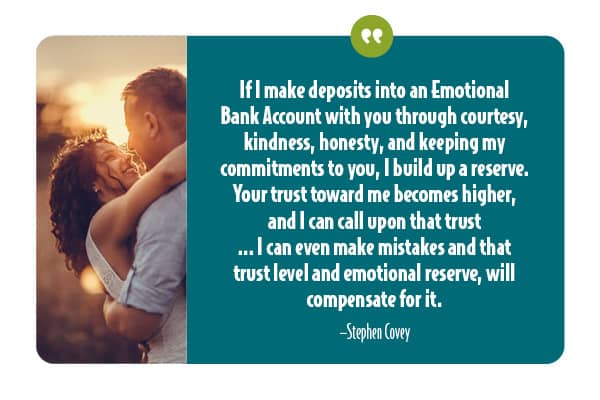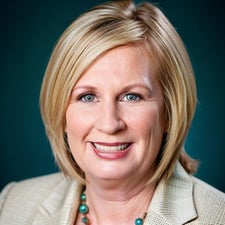Relationships, like everything, have specific keys and habits that either make them easier, more successful, and happier or harder, less successful, and unhappy. Do you know what relationship habits are needed for a happy marriage? Have you shifted into cruise control in your relationship and only think good intentions, but don’t act on them? Or do you make daily choices and actions to intentionally love your partner?
Estimated reading time: 4 minutes
 When we fall in love, the wave of our honeymoon feelings (i.e., a concoction of neurotransmitters) carries us euphorically. Passionate love and attraction earmark this period of our relationship. We idolize our partner, spend every spare minute together, talk for hours learning about each other, and go out of our way to be kind and thoughtful.
When we fall in love, the wave of our honeymoon feelings (i.e., a concoction of neurotransmitters) carries us euphorically. Passionate love and attraction earmark this period of our relationship. We idolize our partner, spend every spare minute together, talk for hours learning about each other, and go out of our way to be kind and thoughtful.
And then we stop doing these things.
Emotional Deposits Versus Emotional Withdrawals—Which Are You Making?
One of the most common issues I observe when working with struggling couples is their accumulated mini-habits that deteriorate their relationship and deflate their love and respect for each other. Every day, they exchange words or do things that eat away at the joy and satisfaction in their relationship, such as rolling their eyes at their partner, pretending to listen, or continually criticizing, blaming, or trying to prove that their partner is “wrong.” Often, couples are making far more emotional withdrawals than emotional deposits with each other—and it shows!
What do I mean by emotional withdrawals and deposits?
Think for a moment of a simple bank account. Money in, money out. It’s a pretty simple concept. What happens when you make too many withdrawals without depositing more? Or you don’t realize how much you’ve been spending until you overdraw your account, resulting in expensive overdrafts. Ouch!
There are no overdraft fees when you keep a comfortable balance in your bank account and spend within (or below) your means. When you take care of your relationship with money, you reap the benefits: peace of mind, compounded interest, and the ability to set aside savings, which provide safety and security as well as the means to spend on things that bring you joy.
Relationships work similarly. If you take from your partner’s emotional bank account too often for too long without replenishing it, you overdraw your relationship account. What happens then? The emotional strain increases, we get curt or let zingers fly, arguments and disagreements get more frequent, and disconnection grows in our relationship.
Emotional Withdrawals
Below are some examples of emotional withdrawals:
- lack of affection or attention
- working too much
- ignoring your partner
- spending excessive time on your phone or computer when with your partner
- canceling dates regularly
- sharp words or criticisms
- making promises that you don’t keep
- blaming and/or defensiveness
- raising your voice
- impatience
You get the idea!
Related reading: “Love Is Sometimes Inconvenient!”
 Be Intentional: Make Regular Emotional Deposits
Be Intentional: Make Regular Emotional Deposits
So, what would be emotional deposits… you guessed it, basically the opposite:
- ample affection
- keeping a healthy work-life balance
- giving attention to and expressing interest in your partner
- random gestures of kindness
- spending quality time together regularly and putting limits on technology
- kind words and appreciation
- keeping your word and promises
- forgiving quickly and apologizing sincerely
- self-calming and soothing before settling differences
- being mindful, patient, and intentional
To make emotional deposits, we need to be intentional and mindful. We need to be attuned and responsive to our partner’s desires and needs, care about their experiences, inquire about what is important to them, and empathize with their emotions.
And if we don’t, we can begin to experience our relationship as hard. Our partner may start triggering negative emotions in us, and then, conflict usually increases and sparks more frequently. We stop feeling heard and seen. We might start thinking that our partner doesn’t really care about us or value us and our relationship anymore.
Every day, we have opportunities to disconnect or connect with our partner. Each moment and every interaction are opportunities to pull away from our partner or turn towards our partner with love.
Related reading: "If You Want a Successful Marriage, Increase Self-Mastery."
What the Research Shows About Stable Marriages
Drs. John and Julie Gottman believe that couples make regular “bids for connection.” Happy couples (or masters) respond lovingly to these bids far more often. Unhappy couples (or disasters, as Gottman refers to them) respond to the bids considerably less.
It turns out that healthy and happy relationships grow from intentional love, making more emotional deposits than withdrawals in their relationship. Gottman’s research shows that stable marriages have a 5:1 ratio of positivity to negativity whereas unstable marriages have a 0.8:1 ratio.
When we are intentional, we are choosing to consciously love our partner. Being intentional means taking action with purpose, deliberately choosing to direct our attention to what is most important in our lives. And if you’re in a love relationship or marriage, your partner is most like rating in the top three!
Try being intentional with your loving. When you’re feeling frustrated, seek to self-soothe or understand your partner’s point of view. When you want to surf the internet or Facebook, put your computer or phone away and turn toward your partner and give them attention. When your partner is too tired to cook, pick up their favorite dinner and surprise them. When they need exercise or self-care, volunteer to watch the kids.
Be intentional. Love intentionally. Make regular emotional deposits in your relationship’s emotional bank account and reap more love from cultivating a healthy and happy relationship!
Related Reading: "Do You Want a Happy Relationship? Develop Healthy Boundaries."If you'd like personalized marriage advice or support as a couple, contact us at support@heartmanity.com.
And for more great tips, sign up for our HeartMail newsletter.









